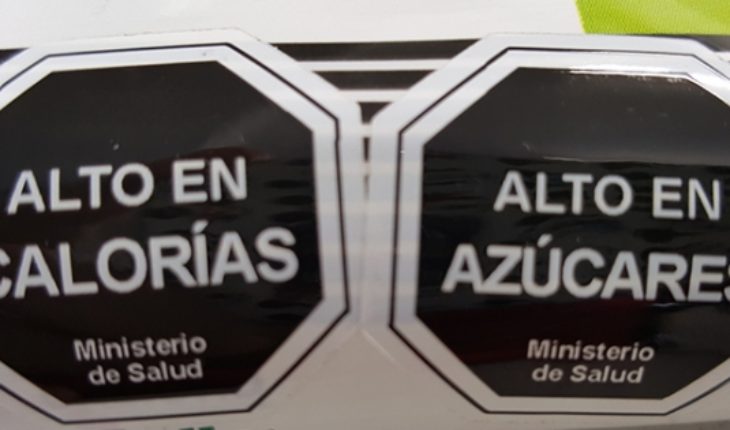an interview uncovered a Pandora’s box. That is what explains to a large extent the real war of statements that has been generated around the labeling law and whose protagonists are Senator Guido Girardi PPD – architect of which initially was known as the traffic light law – and the marine biology entrepreneur after Car ozzi, Gonzalo Bofill.
The disagreement began when the President of Carozzi returned to the charge against the law, which has been implemented by stages and that includes to put black labels on products warning that they are “high on” salt, sugar, sodium and other nutrients critics. The new regulation contemplated adding stamps whereas the content in 100 grams of each product, something that the company of Bofill objected, pointing out that the trend is to label by parts, i.e. by what a person eats each package.
The businessman had put chips in that, with the arrival of Sebastián Piñera to La Moneda, the advancement of the law would smooth out. But that did not happen. Had left him clear in his letter to investors in the annual report of Carozzi 2017, where indicated that “arises the hope to work in a country in which we feel that we all are respected and heard, where the rules of the game are stable to be able to generate m” as development for Chile and its people”.
But almost at the end of this year, the changes proposed by the company did not. Its commitment was to achieve, by means of any observation, reporting on the basis of the amount of nutrients in actual portions of consumption “and the promotion of physical activity is actually helping to fight obesity”. Something that is still fighting.
A liberal right Gonzalo Bofill Velarde is the successor of the holding company Carozzi, founded by his father, Gonzalo Bofill’s case, a businessman who made a fortune in the hands of the boom industries in Valparaiso. Originally from Quilpué, father created a food conglomerate and several well-known brands such as coast, Bonafide, Ambrosoli, agricultural divisions and companies of mills. His son took the reins of the family business for several years and her media profile is closer to the controversy that parsimony, since in general, when you give interviews, it gives a hard character and signs say things bluntly.
The internal noise in AB Chile and arrived even at the Sofofa ears, is that every company should have some freedom of expression. But has also been part of Hall reviews the closeness that Bofill and the President of the Guild, Rodrigo Álvarez, former figure of the UDI, former Minister of the first Government of Piñera and to who the head of Carozzi supported in his failed attempt to dispute the presidenc IA of the trade union organization of the industry.
He was critical of the management of the former President of the Republic Michelle Bachelet, who by 2015 said it was lousy that it wasn’t at the dinner of the Sofofa. He then named his Government as a way to “disenchantment of the policy”. It was not only in the words and articulated precisely the Foundation thinks, to translate their political positions, a think-tank which was launched in June 2016 as a proposal of thought of a group of entrepreneurs from the Fifth Region and which, according to its website – from June 2017 is part of Atlas Network, a network which brings together centres of right thinking, although internationally has been known – in reports from other countries–for their strong links with billionaires and influential right-wing conservatives.
In an interview with El Mercurio on 18 November, Bofill opened fires against the labeling Act and described it as a failure. He called upon that the Minister of health, Emilio Santelices, take charge of the potholes of the regulation and to recognize that the results of the proposal have not been expected.
But in addition to shear the law, in the interview Bofill reviewed who, precisely today, could be his main detractors: the guilds. “They have been weak to defend companies more forcefully,” he said.
A phrase which, in the eyes of some leaders, left clear something was mentioned among the companies grouped in the organization that brings together part of the signatures of food, AB Chile. Not all companies were in accordance with the position of Bofill nor with AB Chile will square up at the corporate level with posture fundamentalist against the law.
After the interview, the first to clarify some points was Senator Girardi and the Minister of health, but the businessman was not silent.
“He calls me so much attention that the Minister of health, Emilio Santelices, following that interview, I publicly accused of lack of seriousness and responsibility for delivering an opinion that, as I have pointed out you two more paragraphs above, is based on objective data, source” FAO, and effectively correspond to the period 2016 and 2017, and not a run-up as assured the Minister. We must not forget that the labeling law was implemented in June 2016. On the other hand, it is incomprehensible that, at the same time, Senator Girardi announced by the press legal action against Carozzi and the Guild of food companies by an alleged smear campaign against food labeling Act. Needless to say that such careful reaction against freedom of expression, runs counter to the essence of democracy and affects healthy coexistence. What is even worse, does not help anything to effectively combat obesity in Chile. They are many people who will appreciate a law that truly help them to educate themselves in nutritional matters, allowing them to compare and know exactly what they are eating,”les said Bofill.
The Senator then – would show on his international tour to participate the meeting report Global nutrition 2018 – “bad companies like Carozzi” aimed to destroy the labeling law that was looking to emulate by India, Pakistan and other countries in Asia. “It seems a paradox that, while Chilean law creates one of the largest consensus and it is seen as an opportunity for many countries to curb its epidemic of obesity, in Chile, unfortunately, a group of companies does not shakes to criticize this law, despite being one of the most powerful instruments we have to defend the health of children and the population,”said.
For its part, the entrepreneur has been supported by some companies that have expressed that they also like law, as Watt’s, Nestle. Unilever CEO also said that the regulation was considerably more expensive production costs.
Conflict of interests?
What ensued was a barrage of opinions in the morning. The Chilean society of Pediatrics, universities, Girardi and the same FAO – who claimed that it had decreased from 25% to 14% the consumption of drinks with sugar – came out to deliver arguments in favor of the law.
Precisely in the field of beverages, Coca-Cola is one of the companies that has put their marketing efforts and productive in reducing their products with sugar. “Like that there are several that, instead of going against the law, adapted its standards”, said one industry executive.
The internal noise in AB Chile and arrived even at the Sofofa ears, is that every company should have some freedom of expression. But has also been part of Hall reviews the closeness that Bofill and the President of the Guild, Rodrigo Álvarez, former figure of the UDI, former Minister of the first Government of Piñera and to who the head of Carozzi supported in his failed attempt to dispute the presidenc IA of the trade union organization of the industry.
“The focus of 100% of the companies has been in law, either being rewritten in those products where it is possible or labeling foods that exceed the limits laid down in the regulation.” In the food industry more or less fundamentalist, only companies that meet the law fully no companies”, said Alvarez to the counter markets.
“On the law, industry there is a broad consensus that regulation requires modifications to make it efficient in the fulfilment of its objective. As Guild we have sought to contribute consistently to the public debate providing information, proposals and experience to a discussion that often has lacked technical fundamentals and has been based on political ideas”, said Alvarez.
The trade union leader considered that “allegations made by Senator Girardi against our industry are unfair and disproportionate. This is a situation that has been repeated in the last few years, so unfortunately already not surprises us, but does not leave us alone. As Guild will always seek to provide our opinion and background, in order to achieve a comprehensive analysis, objective and deep, in order to contribute to better decision-making for the country and the population in general, for it is necessary that all the information is properly considered”.
Market sources added that Alvarez and Carozzi does not operate in block, but that the measures proposed by the company measure per serving would affect some companies to AB Chile and that has stressed the relations. Sugary drinks that achieved with adjustments in their patterns, for example, sold in schools, could be part of companies against this proposal and which may be affected with a change such as that proposed by Carozzi.
Some measures to reduce conflicts of interest already had taken. Since its founding – in 2014, when the structure of Anber Chile was modified and divided Chile – food, AB Chile it is advised by the Agency’s communications links, which sees the public relations of Carozzi. So is decided by common agreement that any issue of labelling to the company would be advised by the B20 Agency, linked to Fernanda Otero, who also played roles in La Moneda first administration piñerista.
“Indeed, we carry Carozzi account for more than 20 years, but” “in the specific case of the discussion on food labelling the joint decision was not working this specific issue with them, as a way to avoid conflicts of interest that could affect the Guild AB Chile, client that ties Advisor since its creation” explained from linkages to the counter markets.
Some companies request was to calm the tone of the fight. Something that even Carozzi tried to do through an insert that sought to speak of proposal and not a fight. But on Saturday, December 1, AB Chile supported Carozzi vision through a column in pulse, the third, in which Alvarez put arguments similar to that originally gave Bofill: “when you want to assess the level of success or failure of public policy It should be with respect to the original objective that motivated its creation. In this case, the food labelling law and its advertising was designed with a clear and explicit mandate: help reduce the rates of obesity and overweight presenting our country. This is a quite common and cross-cutting objective. Despite this, it would be naive to suppose that it is enough to label food to solve a health problem so deep. In this there is full consensus between industry, the authority and the academic world. Cannot be attributed you a complex responsibility to a single tool”.
In that column, Alvarez added that “argue that the law has been successful because perception surveys show that Chileans value with the rules, is known, companies obviously fulfilled it, because sales of a particular category is” they contracted during a specific period (without knowing, even how it behaves now), or because companies have shown the disposition – well before the law – re-thinking food, I think it is to simplify the assessment, with the only idea of wanting to validate a rules, beyond the scientific evidence that is available”.
The column upset companies who do not want to continue paddling for the other side.
Carozzi from Carozzi posture spoke with the counter markets and explained that what they propose is perfect regulation, does not rebut the foundations of law. Thus, the proposal of the company is based on give additional information on labels. “It includes the total amount of calories or ingredient that highlights the label, in order to help people to compare between different foods in a faster and easier way. Experts say that most people don’t read the nutritional table on the back of the packaging, so move this information to the front labels would be a contribution to consumer. Thus, in a very simple way, the same labelling that is already rooted in the Chilean population would allow us to compare between products and informed us that really are going to eat, in order to make better decisions”, said the firm.
Carozzi argued that the regulations that applied the labeling law punished smaller formats. His proposal is that lots of consumption should be reduced to improve indicators of obesity and overweight, especially for children. WHO has established that “limit the size of the rations can be an effective intervention to prevent overeating and possibly reduce the risk of overweight and obesity among children. On the other hand, a study by McKinsey in 2014 on the efficiency of 74 measures to combat obesity in the United Kingdom concluded that portion control is the best measure in terms of cost efficiency to reduce obesity”, they explained.
Regarding potential conflicts of interest, the firm controlled by the family Bofill said that “we are all companies in AB Chile working to achieve this goal and proposing initiatives so that people have access to more and better information to” make better consumption decisions. We will continue to work to contribute to the education and promotion of healthy habits”.
translated from Spanish: Read the label: what lies behind the struggle of black seals
December 5, 2018 |





